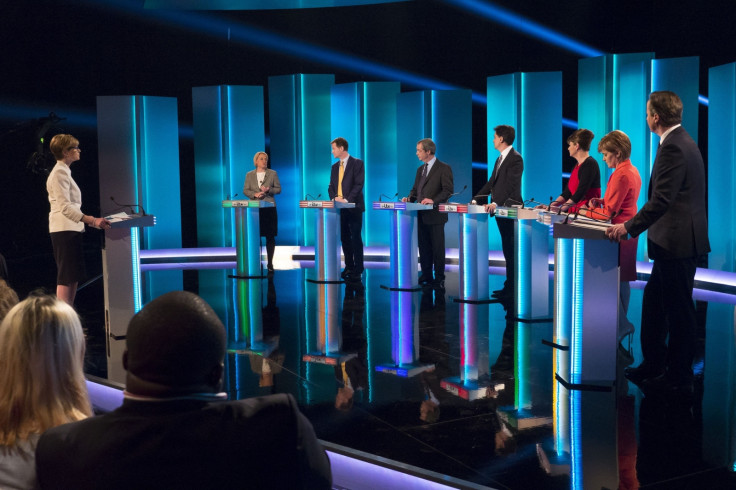Leaders' debate: Coalition torn apart as David Cameron and Nick Clegg clash over Number 10 record

David Cameron and Nick Clegg brought the coalition crashing down by clashing over their record in government in ITV's seven-way leaders' debate.
The prime minister and his deputy fought over spending, with Clegg asking how Cameron could talk of a choice between "competence and chaos" when NHS workers were worrying about funding and schools and nurseries cleared closure.
Labour leader Ed Miliband was criticised for his record in the government that "almost bankrupted the country".
Nigel Farage, while proving popular with viewers, stirred controversy when he cited foreigners with HIV as a drain on the NHS.
Green Party leader Natalie Bennett stated the need for a fairer economy as well as environmental reform and Nicola Sturgeon admitted she wanted an independent Scotland.
Plaid Cymru's Leanne Wood said any referendum on European Union membership should be held in each UK nation.
Each leader broadly stated how they would govern the UK if they were elected at the 7 May general election.
Cameron said the UK "was on the brink" when the coalition was formed in 2010, but thanks to the Tory-led long term economic plan, the government had "invested in the NHS and cut taxes for 30 million people".
The choice, he said, "is sticking with plan that works or going back to the mess" of a Labour government.
Miliband said "for five years wages have not kept up with bills" and "the NHS had gone backwards". But, he added, it "Does not have to be this way".
He said the minimum wage would rise to £8 an hour under Labour and extra funding NHS funding would be found by measures including taxing the rich and through a mansion tax.
Clegg said the £50bn of cuts planned by Cameron and George Osborne in the next parliament was "far too much", saying the Lib Dems would "cut less than the Conservatives and borrow less than Labour."
Making her case for the SNP, Sturgeon said austerity had "pushed people into poverty" and called for modest spending increases.
One of the most controversial moments came when Farage said there were 7,000 diagnoses each year for foreign HIV patients, 60% of whom were not British. He suggested drugs that cost £25,000 for such patients were a drain on the NHS.
His comment was seized upon by Wood and thousands of Twitter users who criticised Farage for supposedly insensitive comments.
Proceedings were twice interrupted by a reported Green voter, who heckled Cameron for failing to protect homeless ex-servicemen and for paving the way for fracking. An unruffled Cameron addressed her concerns before she was ejected.
Immigration was discussed at length, but while the topic was billed as Farage's pedestal the MEP was criticised by Sturgeon and Clegg, the latter of which said "Nigel Farage thinks everything wrong in the world can be solved by EU referendum".
There was heated discussion over education, the future of the NHS as well as policies for young people, but when the leaders were asked for a final statement, each spoke directly to voters at home.
Cameron said he "wanted to the finish job he started," that he had halved the deficit and wanted to "get in the black" he called for a genuine 7-day NHS and above all us "security for your family, you and your country."
Milband promised to "reward the hard work of everybody in the country and to cut the deficit every year while protecting health and education.
Clegg asked voters vote Lib Dem to keep the country "stable, strong and fair", while Farage said only Ukip offered "real change in Westminster".
The Greens wanted voters to "vote for that you believe in. Don't vote for the lesser of two evils", Bennett said and Sturgeon called on Scots to vote SNP to give their nation a louder voice.
Wood said only Plaid Cymru could provide a stronger Wales.
© Copyright IBTimes 2025. All rights reserved.






















